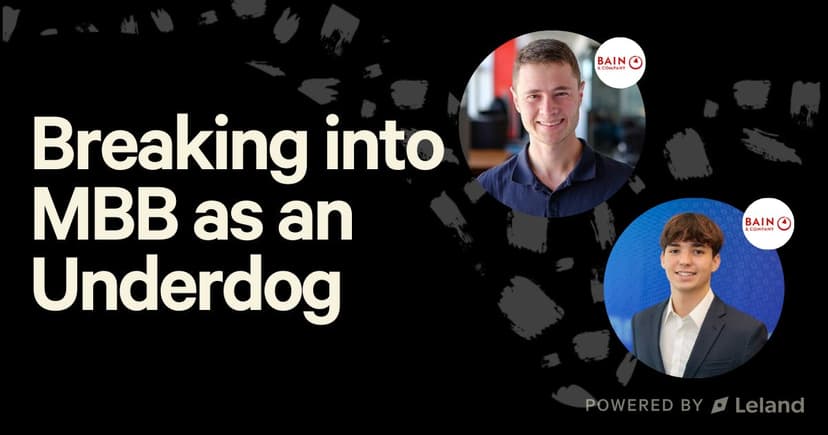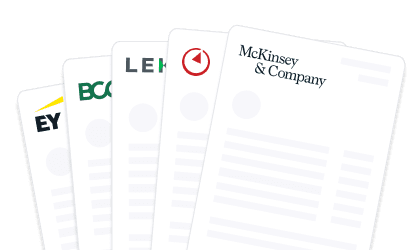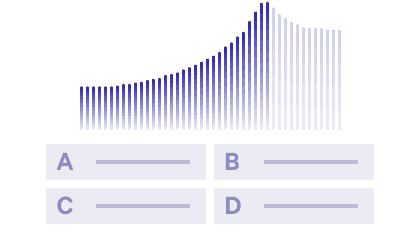How to Land a Bain Associate Consultant Role: Application, Resume, & Interview Tips
Learn how to land a Bain Associate Consultant role with clear tips on the application process, resume formatting, interview prep, and what Bain looks for.
Posted July 30, 2025

Join a free event
Learn from top coaches and industry experts in live, interactive sessions you can join for free.
Table of Contents
The Bain Associate Consultant role is one of the most competitive and respected positions for students and early-career professionals entering consulting. This role offers early exposure to real client work, a steep learning curve, and the chance to develop critical skills that support long-term career growth.
This guide is for candidates who are preparing to apply for the Bain Company Associate Consultant role, whether you’re still in school, just graduated, or looking to move into consulting from another field. I’ll walk through everything you need to know about the application process, resume best practices, how to prepare for the interview, and what to expect once you start.
What Does a Bain Associate Consultant Do?
Role Responsibilities
As an associate consultant, you’ll work on project teams staffed with experienced consultants. Your day-to-day tasks may include analyzing data, conducting research, creating slide decks, attending internal team meetings, and presenting findings to case team leaders or clients. You may also be expected to find insights or solutions during project work, actively seeking to understand how decisions are made within real business settings. You’ll be expected to take ownership of your work early on.
You’ll be a generalist at the start, meaning you can be assigned to projects across industries, tech, healthcare, private equity, and retail, depending on business needs and staffing decisions. You’ll learn how Bain approaches problem-solving and gain experience that’s relevant across any sector.
Skills Bain Looks For
Bain values structured thinking, communication, and analytical ability. But beyond that, they look for people who can work well in teams, stay curious, and remain coachable under pressure. Strong interpersonal skills matter as much as raw intelligence.
Here are some of the key traits Bain wants in associate consultant candidates:
- Clear communication
- Data-driven thinking
- Resilience and ownership
- Leadership in school or work settings
- Coachability and willingness to improve
Career Path After AC
Most ACs stay in the role for two to three years before being promoted to Consultant or leaving for an MBA. The learning curve is steep, but that’s part of the appeal. Bain gives ACs real responsibility and invests heavily in their development.
AC vs. Consultant Role
Some experienced candidates ask if they should apply directly to the Consultant role. It depends on your background. If you already have 2–4 years of relevant experience, a master’s degree, or strong leadership experience in a related industry, it might make sense to ask Bain about being evaluated for Consultant instead of AC. But Bain will always assess where you can have the most impact and succeed long-term.
Eligibility and Who Bain Hires
Academic Background
Most associate consultant hires come from top undergraduate programs. Bain recruits heavily at target schools but does consider applicants from non-target backgrounds as well. A strong GPA, relevant coursework, and internships will help strengthen your case. Preferred majors often include:
- Economics
- Business
- Engineering
- Math or Statistics
- Computer Science
That said, Bain hires from many disciplines. What matters is your ability to think clearly and communicate your ideas.
Read: How to Land a Bain Internship
Candidate Traits
Bain is looking for people who have shown leadership, worked on real problems, and made a measurable impact. If you’ve led student groups, launched a small project, or helped a team perform better, those are the kinds of things that matter. Your background doesn’t have to be perfect. What matters is showing progress, initiative, and the ability to learn quickly.
Diversity, Equity, and Inclusion
Bain has a strong commitment to diversity. If you’re part of an underrepresented group, there may be tailored recruiting events or application tracks for you. You can also join our monthly webinars newsletter to learn more about events, info sessions, and scholarship offerings aimed at increasing representation.
The Bain Associate Consultant Recruiting Timeline
On-Campus Recruiting
Bain hires most of its ACs through structured recruiting cycles that start in the fall. If you’re still in school, keep an eye out for information sessions, webinars, and resume drops through your career center. Application deadlines usually fall between late August and September. Make sure to:
- Attend your school’s Bain presentation
- Join their mailing list to hear about upcoming events
- Select your preferred office in your application
Off-Cycle and Internship Recruiting
If you miss the main cycle or come from a non-target school, there may still be off-cycle openings. The Associate Consultant Intern (ACI) role is also available to juniors. Strong performance in the internship often leads to a full-time offer.
How to Craft a Winning Application
Resume Tips
Bain expects a one-page resume. Make it simple, clear, and results-focused. The best way to stand out is by showing impact in each bullet point using data and strong verbs. Here’s what they’re looking for:
| Good Resume Practice | What It Looks Like |
|---|---|
| Use action verbs | “Led,” “Analyzed,” “Developed,” “Increased” |
| Quantify results | “Reduced costs by 20%” or “Increased engagement 3x” |
| Focus on outcomes, not tasks | Show what changed because of your work |
| Keep the layout clean | No colors, photos, or distracting formatting |
Including specific details about your achievements and responsibilities helps your resume stand out and demonstrates your impact more clearly.
Common resume mistakes to avoid:
- Generic bullet points
- Paragraphs instead of bullet lists
- No numbers or impact
Cover Letter (If Required)
Some offices require a cover letter. If they do, keep it to 3–4 paragraphs. Explain why you want to join Bain Company, why you’re interested in consulting, and how your background is relevant to the role. Don’t repeat your resume. Use the letter to show your personality and motivation.
Networking & Referrals
Talking to current Bain consultants or associate consultants can help you stand out. If you’re from a non-target school, this is even more important. Here’s how to build relationships:
- Reach out to alumni or Bain consultants on LinkedIn
- Keep messages short and specific
- Ask for a short 15-minute call, not a job
Note: If you connect with someone and the conversation goes well, you can ask if they’d feel comfortable referring you.
Inside the Bain Interview Process
Landing a Bain associate consultant offer requires strong performance across both behavioral and case interviews. The format is consistent across offices, but small variations exist based on geography, hiring volume, and role type (internship vs. full-time). Below is a breakdown of what to expect, how to prepare, and what actually matters during each stage.
To further clarify your preparation strategy, consider having a detailed discussion with a recruiter or coach to receive personalized advice and ensure you are fully prepared for each interview stage.
Interview Format: What to Expect
Bain Company’s interview process typically includes two rounds, each made up of a behavioral (fit) interview and a case interview. Some offices, especially international or non-core locations, may also include:
- A written case with a time limit and a short presentation
- An online problem-solving assessment
- A brief HR or recruiter screen before Round 1
Format consistency:
- Both virtual and in-person formats follow the same structure.
- The content of interviews does not change whether you’re interviewing for an Associate Consultant or an Associate Consultant Intern role.
- Each interviewer evaluates both behavioral and case performance.
Behavioral Interviews: What They’re Looking For
Bain’s behavioral interviews test whether you have the mindset, experience, and communication skills to succeed in a team-based, high-pressure consulting environment. Every question is designed to assess one or more of the following:
- Leadership under pressure
- Ownership of outcomes
- Ability to learn from failure
- Team collaboration and humility
Common Behavioral Questions at Bain
You’ll likely be asked:
- Why do you want to join Bain Company?
- Tell me about a time when you had to convince someone of your idea.
- Describe a team conflict and how you resolved it.
- What’s a time when you failed, and how did you handle it?
- When did you take initiative to solve a problem that wasn’t assigned to you?
Strong Answer Framework: CE (Context–Example)
Avoid vague responses. Use a Context–Example (CE) structure instead of the more rigid STAR. This allows you to focus more on the results and less on the filler.
Example Breakdown:
- Context: Give just enough background for the interviewer to understand the setting.
- Example: Go straight into the story. What was your role? What action did you take?
- Result: Focus on the impact. Use data when possible. What changed because of your work?
Expert Tip: Prepare 4–6 stories in advance. Write them out, label each with the trait it reflects (e.g., leadership, impact, resilience), and rehearse adapting each one to different prompts.
Case Interview Expectations: What Matters Most
The case interview is designed to simulate real work you’ll do as a Bain associate consultant. You’ll be given a hypothetical business problem, and your interviewer will evaluate how you structure, solve, and communicate your thinking in real-time.
Common Types of Bain Case Interviews
These are the most frequent categories, based on recent reports from candidates and coaches:
| Case Type | Example Prompt |
|---|---|
| Profitability | “Client profits are down; identify the cause and solution.” |
| Market Entry | “Should a U.S. retailer enter the Japanese market?” |
| Pricing Strategy | “How should a software company price its new subscription model?” |
| M&A | “Should the client acquire a smaller competitor?” |
| New Product Launch | “Estimate demand and go-to-market plan for a wearable device.” |
Bain cases are often more conversational than McKinsey’s and less rigid than BCG’s. Interviewers may guide you or give data prompts. They want to see how you develop your thinking, not whether you memorize frameworks.
What Bain Interviewers Evaluate
| Skill | What It Looks Like in Practice |
|---|---|
| Problem Structuring | Breaking problems into clear, MECE buckets |
| Data Comfort | Doing math clearly and explaining insights from charts/tables |
| Communication | Speaking clearly, asking relevant questions, and actively listening |
| Coachability | Adjusting based on feedback mid-case or when prompted |
| Business Judgment | Offering logical recommendations that align with real-world dynamics |
Expert Tip: Always verbalize your logic as you go. Interviewers aren’t just evaluating your final answer; they’re scoring how you think, process information, and adapt when something changes.
The Best Case Prep Resources
Don’t overwhelm yourself with every prep book or course. Focus on these high-quality, Bain-aligned resources:
| Resource | Best For |
|---|---|
| Leland Coaching Platform | 1:1 mock interviews with Bain alumni |
| Victor Cheng – Case Interview Secrets | Frameworks and mental approach |
| Case in Point – Marc Cosentino | Beginner-level case walkthroughs |
| Look Over My Shoulder Series | Real case recordings with expert feedback |
| CaseCoach or PrepLounge | Case partner matching and problem sets |
Practice Strategy:
- Do at least 15 live mock cases with partners.
- Track your mistakes and adjust.
- Record yourself during practice to review pacing, tone, and structure.
- Include drills: mental math, chart reading, and brainstorming under pressure.
If you want to explore case prep more thoroughly, consider seeking a more detailed discussion or coaching session for personalized advice.
What Makes the Bain Company Unique and How to Show Fit
Culture and Mentorship
Bain is known for its “Bainie” culture, which values collaboration, direct feedback, and helping each other grow. New hires are paired with career advisors, and teams invest time in giving coaching during projects.
Home Office Model
You apply to a specific office and get staffed from there. While some projects may be remote or global, your main team and manager come from your home office.
This gives you more stability and a stronger internal network.
Showing Fit
Show that you care about growth, feedback, and working in teams. Use interview examples that highlight how you work with others and take ownership. That’s how you show you’ll succeed and continue to grow at Bain.
Expert Tips for Success
Preparation Mindset
Bain is not looking for candidates who memorize frameworks or follow scripts. Instead, they focus on how well you can break down unfamiliar problems, ask the right questions, and adjust your thinking as new information is introduced. The best candidates are structured, calm, and able to explain their logic clearly.
To prepare, spend time practicing real cases with a partner, not just reading examples. Focus on your ability to explain your reasoning out loud. Being able to communicate with clarity and confidence is just as important as getting the math right. You don’t need a perfect answer. You need to show that you think logically, respond well to feedback, and keep moving forward when the case gets more complex. Working with a coach or former interviewer can help you develop these skills faster. Mock interviews with real feedback are one of the most effective ways to improve.
Following Up
After each interview round, send a short and professional thank-you email to your interviewers. Mention something specific you appreciated or learned from the conversation. It doesn’t need to be long, just clear and sincere. If you don’t receive an offer, you can still reapply in the next cycle. Bain allows reapplications after about six to twelve months, depending on the office. Use that time to work on your weak spots. If possible, request feedback from the recruiter and take notes while it’s fresh. Many successful applicants landed their role on a second or even third attempt.
Encouragement
Getting an offer from Bain Company is competitive, but not out of reach. Every year, Bain hires hundreds of associate consultants. Many didn’t go to target schools or start with perfect resumes. What they had in common was preparation, persistence, and the ability to improve. If you focus on learning how to solve problems, tell clear stories, and work well with others, you can stand out. Start early, get help where needed, and keep improving until you’re ready. That’s what leads to success.
Work With a Former “Bainie” Today
Leland coaches help candidates like you land consulting offers every cycle. If you want help reviewing your resume, prepping for interviews, or just getting advice from someone who’s worked at Bain Company, we have experts ready.
- Caitlin B.- Former AC and MBA coach
- Jeremy S.- Ex-Bain Consultant with a focus on interview prep
- Lexi T.- Specializes in behavioral interview coaching and DEI support
- Andrew H.- Known for helping candidates build clear case frameworks
Browse all the management consulting coaches.
You can also:
- Read verified reviews from successful candidates
- Join our free consulting events to hear about upcoming sessions
- Sign up for the Management Consulting Recruiting Bootcamp to get guided support across resume, networking, and case prep
Read these next:
- 50+ Case Interview Questions From Top Firms
- How to Get an Interview at Bain & Company
- A Comprehensive Guide to MBB: McKinsey & Co., Boston Consulting Group, and Bain & Co.
- Big 4 Consulting Firms vs. MBB: What's the Difference
- Bain Assessment (Gorilla Test): What it Is & How to Ace It
- Bain BEL Deadline: Important Dates and Tips for Success
Bain Associate Consultant – FAQs
What does an associate consultant at Bain do?
- An associate consultant at Bain works on client case teams to analyze data, develop insights, and support strategy recommendations. The role includes research, modeling, and presenting findings to team leads.
How much do associate consultants make at Bain?
- Associate consultants at Bain in the U.S. earn a total annual compensation ranging from $122K to $179K. This includes base salary, performance bonuses, and profit sharing.
What does an associate consultant do?
- An associate consultant supports consulting projects by breaking down business problems, analyzing data, and contributing to client deliverables. The role requires strong problem-solving and communication skills.
What is the stipend for an Associate Consultant Intern at Bain?
- Associate Consultant Interns at Bain typically earn a prorated salary based on full-time compensation, which averages around $10,000 to $12,000 per month in the U.S., depending on the office location.
Browse hundreds of expert coaches
Leland coaches have helped thousands of people achieve their goals. A dedicated mentor can make all the difference.


























